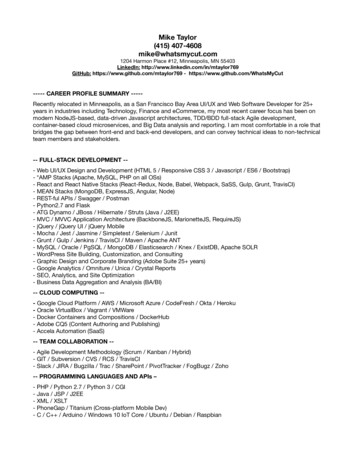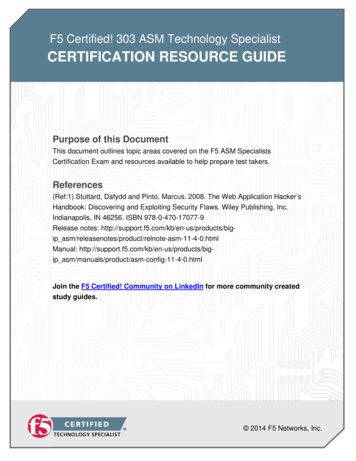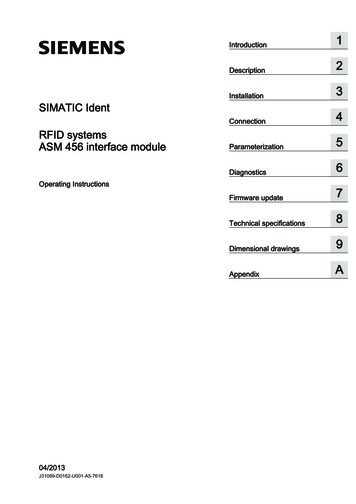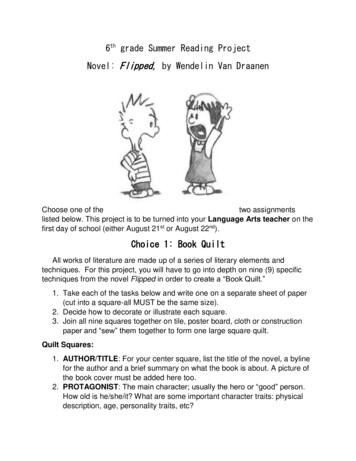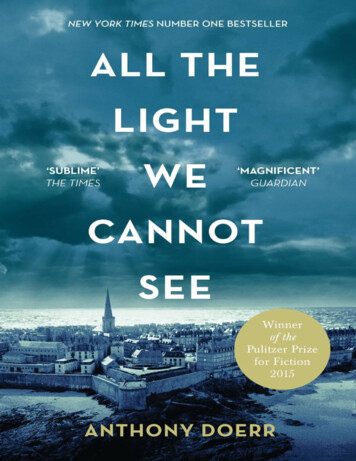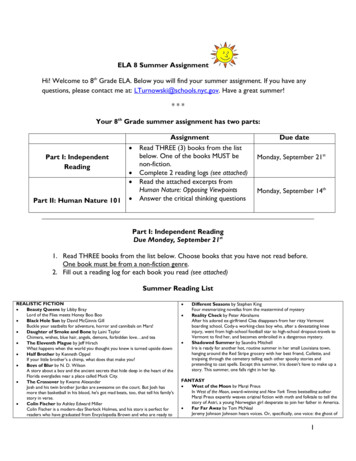
Transcription
MikeLupicaPHILOMEL BOOKS
ACKNOWLEDGMENTSI would like to first thank Lourdes LeBatard,who so generously helped me with the beautiful words of Cuba.Additional thanks go out to all the Little League baseball coachesfrom whom I have learned along the way, from the greatCliff McFeely to Kevin Rafalski. And to all the other coaches whounderstand what Michael Arroyo does in the pages of this book:The game belongs to the kids playing it.Finally, Michael Green: Who always had a clear,fine vision of what should be happening on both sides ofthose blue barriers outside Yankee Stadium.
PHILOMEL BOOKS A division of Penguin Young Readers Group. Published by The Penguin Group. Penguin Group(USA) Inc., 375 Hudson Street, New York, NY 10014, U.S.A. Penguin Group (Canada), 90 Eglinton Avenue East, Suite700, Toronto, Ontario, Canada M4P 2Y3 (a division of Pearson Penguin Canada Inc.) Penguin Books Ltd, 80 Strand,London WC2R 0RL, England. Penguin Ireland, 25 St. Stephen’s Green, Dublin 2, Ireland (a division of PenguinBooks Ltd.) Penguin Group (Australia), 250 Camberwell Road, Camberwell, Victoria 3124, Australia (a division ofPearson Australia Group Pty Ltd). Penguin Books India Pvt Ltd, 11 Community Centre, Panchsheel Park, New Delhi110 017, India. Penguin Group (NZ), Cnr Airborne and Rosedale Roads, Albany, Auckland 1310, New Zealand (adivision of Pearson New Zealand Ltd). Penguin Books (South Africa) (Pty) Ltd, 24 Sturdee Avenue, Rosebank,Johannesburg 2196, South Africa. Penguin Books Ltd, Registered Offices: 80 Strand, London WC2R 0RL, England.Copyright 2006 by Mike Lupica. All rights reserved. This book, or parts thereof, may not be reproducedin any form without permission in writing from the publisher, Philomel Books, a division of Penguin YoungReaders Group, 345 Hudson Street, New York, NY 10014. Philomel Books, Reg. U.S. Pat. & Tm. Off.The scanning, uploading and distribution of this book via the Internet or via any other means withoutthe permission of the publisher is illegal and punishable by law. Please purchase only authorized electroniceditions, and do not participate in or encourage electronic piracy of copyrighted materials. Your support ofthe author’s rights is appreciated. The publisher does not have any control over and does not assumeany responsibility for author or third-party websites or their content. Published simultaneously inCanada. Printed in the United States of America. Design by Gina DiMassi. Text set in Charter.Library of Congress Cataloging-in-Publication Data Lupica, Mike. Heat / Mike Lupica. p. cm. Summary:Pitching prodigy Michael Arroyo is on the run from social services after being banned from playing LittleLeague baseball because rival coaches doubt he is only twelve years old and he has no parents to offer themproof. [1. Brothers—Fiction. 2. Orphans—Fiction. 3. Illegal aliens—Fiction. 4. Cubans—Fiction. 5. LittleLeague baseball—Fiction. 6. Baseball—Fiction. 7. Social service—Fiction.] I. Title. PZ7.L97914Hea 2006[Fic]—dc22 2005013521 ISBN: 1-4295-2709-9First Impression
This book is for Taylor Lupica.She has always believed in me,and that I should be writing bookschildren want to read.It is also for our own amazing children:Christopher, Alex, Zach, and Hannah.They have not just made me a better person.They have made me a better writer.
1MRS. CORA WALKED SLOWLY UP RIVER AVENUE IN THE SUMMER HEAT, SECUREwithin the boundaries of her world. The great ballpark, YankeeStadium, was on her right. The blue subway tracks were above her,the tracks colliding up there with the roar of the train as it pulledinto the station across the street from the Stadium, at 161st Streetand River.The two constants in my life, Mrs. Cora thought: baseball andthe thump thump thump of another train, like my own personalrap music.She had her green purse over her arm, the one that was supposed to look more expensive than it really was, the one the boysupstairs had bought for her birthday. Inside the purse, in the bankenvelope, was the one hundred dollars—Quik Cash, they calledit—she had just gotten from a Bank of New York ATM. Her foodmoney. But she was suddenly too tired to go back to the ImperialMarket. Mrs. C, as the kids in her building called her, was preparing for what could feel like the toughest part of her whole day, thewalk back up the hill to 825 Gerard from the Stadium.Now she moved past all the stores selling Yankeesmerchandise—Stan’s Sports World, Stan the Man’s Kids andLadies, Stan the Man’s Baseball World—wondering as she didsometimes if there was some famous Yankee who had beennamed Stan.He hit her from behind.She was in front of Stan’s Bar and Restaurant, suddenly fallingto her right, onto the sidewalk in front of the window as she felt the1
green purse being pulled from her arm, as if whoever it was didn’tcare if he took Mrs. Cora’s arm with it.Mrs. Cora hit the ground hard, rolled on her side, feeling dizzy,but turning herself to watch this . . . what? This boy not much bigger than some of the boys at 825 Gerard? Watched him sprint downRiver Avenue as if faster than the train that was right over her headthis very minute, pulling into the elevated Yankee Stadium stop.Mrs. Cora tried to make herself heard over the roar of the4 train.“Stop,” Mrs. Cora said.Then, as loud as she could manage: “Stop, thief!”There were people reaching down to help her now, neighborhood people she was sure, voices asking if she was all right, if anything was broken.All Mrs. Cora could do was point toward 161st Street.“My food money,” she said, her voice cracking.Then a man’s voice above her was yelling, “Police!”Mrs. Cora looked past the crowd starting to form around her,saw a policeman come down the steps from the subway platform,saw him look right at her, and then the flash of the boy making aleft around what she knew was the far outfield part of the Stadium.The policeman started running, too.The thief’s name was Ramon.He was not the smartest sixteen-year-old in the South Bronx.Not even close to being the smartest, mostly because he had alwaystreated school like some sort of hobby. He was not the laziest, either, this he knew, because there were boys his age who spent muchmore time on the street corner and sitting on the stoop than he did.But he was lazy enough, and hated the idea of work even morethan he hated the idea of school, which is why he preferred to oc2
casionally get his spending money stealing purses and handbagslike the Hulk-green one he had in his hand right now.As far as Ramon could tell at this point in his life, the only realjob skill he had was this:He was fast.He had been a young soccer star of the neighborhood in hisearly teens, just across the way on the fields of Joseph Yancy park,those fields a blur to him right now as he ran on the sidewalk at theback end of Yankee Stadium, on his way to the cobblestones ofRuppert Place, which ran down toward home plate.“Stop! Police!” Ramon heard from behind him.He looked around, saw the fat cop starting to chase him, wobbling like a car with a flat tire.Fat chance, Ramon thought.Ramon’s plan was simple: He would cut across Ruppert Placeand run down the hill to Macombs Dam Park, across the basketballcourts there, then across the green expanse of outfield that the twoballfields shared there. Then he would hop the fence at the far endof Macombs Dam Park and run underneath the overpass for theexit from the Deegan Expressway, one of the Stadium exits.And then Ramon would be gone, working his way back towardthe neighborhoods to the north, with all their signs pointing toward the George Washington Bridge, finding a quiet place to counthis profits and decide which girl he would spend them on tonight.“Stop . . . I mean it!” the fat cop yelled.Ramon looked over his shoulder, saw that the cop was alreadyfalling behind, trying to chase and yell and speak into the walkietalkie he had in his right hand all at once. It made Ramon want tolaugh his head off, even as he ran. No cop had ever caught him andno cop ever would, unless they had begun recruiting Olympicsprinters for the New York Police Department. He imagined himself3
as a sprinter now, felt his arms and legs pumping, thought of theold Cuban sprinter his father used to tell him about.Juan something?No, no.Juantarena.Alberto Juantarena.His father said it was like watching a god run. And his father, the old fool, wasn’t even Cuban, he was Dominican. Theonly Dominican who wanted to talk about track stars instead ofbaseball.Whatever.Ramon ran now, across the green grass of Macombs Dam Park,where boys played catch in the July morning, ran toward the fenceunderneath the overpass.It wasn’t even noon yet, Ramon thought, and I’ve alreadyearned a whole day’s pay.He felt the sharp pain in the back of his head in that moment,like a rock hitting him back there.Then Ramon went down like somebody had tackled himfrom behind.What the . . . ?Ramon, who wasn’t much of a thinker, tried to think what hadjust happened to him, but his head hurt too much.Then he went out.When the thief opened his eyes, his hands were already cuffed infront of him.The fat policeman stood with a skinny boy, a tall, skinny boywith long arms and long fingers attached to them, wearing aYankees T-shirt, a baseball glove under his arm.“What’s your name, kid?”4
The one on the ground said, “Ramon,” thinking the policemanwas talking to him.The cop looked down, as if he’d forgotten Ramon was there.“Wasn’t talking to you.”“Michael,” the skinny boy said. “Michael Arroyo.”“And you’re telling me you got him with this from home plate?”The cop held up a baseball that looked older than the oldStadium that rose behind them to the sky.“Got lucky, I guess,” Michael said.The cop smiled, rolling the ball around in his hand.“You lefty or righty?”Now Michael smiled and held up his left hand, like he was a boywith the right answer in class.“Home plate to dead center?” the cop said.Michael nodded, like now the cop had come up with theright answer.“You got some arm, kid,” the cop said.“That’s what they tell me,” Michael said.5
2PAPI WAS THE FIRST TO TELL MICHAEL ARROYO HE HAD THE ARM.Michael thought it was just something a father would say to ason. But he knew there was a look Papi would get when he said it,as though he were seeing things Michael couldn’t, back when it wasjust the two of them playing catch on that poor excuse of a field behind their apartment building in Pinar del Rio, outside of Havana.Back home—what Michael still thought of as home, he couldn’thelp himself—everybody knew his father as Victor Arroyo. But hewas Papi to Michael and his brother, Carlos. Always had been, always would be.“You cannot teach somebody to have an arm like yours,” Papiwould say, walking out from behind the plate and sticking the ballback inside Michael’s glove. Like they were having a conference onthe mound during a game. “It’s something you are born with, a giftfrom the gods, like a singer’s voice. Or a boxer’s left hand. Or anartist’s brush.”This was when Michael was seven years old, maybe eight, longbefore they got on the boat that night last year, the one that tookthem across the water to a place on the Florida map called Big PineKey. . . .“Someday,” Papi would say, “you will make it to the WorldSeries, like the brothers Hernandez did. But before that, my son,what comes first?”Michael always knew what the answer was supposed to be.“First, the Little League World Series,” he would say to hisfather.6
“On ESPN,” Papi would say, grinning at him. “The worldwideleader in sports.”Papi always made it sound as if that was supposed to beMichael’s first great dream in baseball, to make it to the LittleLeague World Series in Williamsport, Pennsylvania—Papi alwaysshowing him Pennsylvania on the ancient spinning globe they keptin the living room—for the world’s championship of eleven- andtwelve-year-old baseball boys.Michael knew better, even then.Michael knew that it was more his father’s dream than his own.Papi had grown up in a time when a star Cuban baseball player,which Michael knew Papi sure had been as a young man, couldnever think about escaping to America, the way others would later,the most prominent lately being the Yankee pitcher RicardoGonzalez. El Grande, as he was known. So Papi, a shortstop on thenational team in his day, never made it out, never made the greatstage of the major leagues.He became a coach of Little League boys instead, in charge ofgrooming them even then to become stars later for Castro’s national team.And from the time he saw that Michael had the arm, he hadtalked about the two of them traveling to Williamsport togetherand having their games shown around the world.Even now, Michael couldn’t tell where Papi’s dream ended andhis own began.The dream had moved, of course, from Pinar del Rio to theBronx, New York. Papi was no longer his coach and Michael wasno longer a little boy. He had grown into the tallest player on histeam during the regular season, and now the tallest on his All-Starteam.It was the All-Star team from the Bronx that Michael’s left7
arm was supposed to take all the way to Williamsport in a fewweeks.As long as he didn’t get found out first.His brother Carlos had promised they could have a catch behind thebuilding when he finished his day shift at the Imperial, the foodmarket across 161st Street next to McDonald’s, almost directly underneath the subway platform.This was before Carlos went off to his night job, the one he saidhad him busing tables at Hector’s Bronx Café, a few stops up onthe 4 train. Carlos said he had lied about his age to get the job atHector’s, telling them he was eighteen already, and no one hadbothered to ask him for a birth certificate. The main reason for that,Carlos had told Michael, was that he was being paid off the books.Making it sound like a secret mission almost.“What does that mean, off the books?” Michael had asked.Carlos said, “It means, little brother, that this is the perfect jobfor me, at least for the time being. In the eyes of Official Persons, Idon’t even exist.”Carlos was always talking about Official Persons as if they werethe bad guys in some television show.Now, cooking their Saturday morning breakfast of pancakesand chorizo, their Cuban sausage, Carlos smiled at his brother andsaid, “My little brother, Miguel, the hero of the South Bronx.”“Guataca,” Michael said. Flatterer.“Just eat your breakfast,” Carlos said. “You’re turning into afreaking scarecrow, Miguel. Even thinner than a birijita.”It was a Cuban expression for a thin person.In the small, rundown apartment, their conversation was always a combination of Spanish and English. Their old life and theirnew one. It was only here, when it was just the two of them, that8
Carlos would ever call his little brother by his birth name—Miguel.To everyone else, it was always Michael.Michael still thought of Havana as home, because he was bornthere. And he had been Miguel Arroyo there.Here, he was Michael.“You’re not exactly a heavyweight boxer yourself,” Michael said.“I have an excuse,” Carlos said, “running from one job to another.”“And then running from table to table, right?” Michael said.Carlos smiled at him. “Right,” he said. “Like I am passing platesin a relay race instead of the baton.”“Maybe I could get a job,” Michael said.Carlos laughed. “And maybe you’re too busy fighting crime,somehow turning baseballs into guided missiles.”“I told you,” Michael said, “it was a lucky throw. I saw him running, I heard the policeman . . .”“Then you just managed to hit him in the back of his hard headfrom . . . how many feet away?”Michael grinned. “The trick is leading him just right.” Hejumped up from his chair, his mouth full, made a throwing motion. “Like a quarterback leading his favorite wide receiver.”Then he added, “If I’d known it was that purse you got for Mrs.C on her birthday, I would have run after him and hit him witha bat.”“Mrs. C is telling the whole building you were meant to be onthe field, like you were an angel,” Carlos said.“The only Angels are in the American League West,” Michaelsaid, “with halos on their caps.” He poured more Aunt Jemimasyrup on his stack with a flourish, finishing as though dotting an i.“If there are real angels in the world,” Michael said to his brother,“how come they’re never around when we need them?”9
“Don’t talk like that.” Putting some snap into his voice, like hewas snapping a towel at Michael.Michael looked over and saw him at the counter, opening an envelope, making a face, tossing it in a drawer.“Why not? It’s true,” Michael said.“Papi said if we had all the answers we wouldn’t have anythingto ask God later.”“I want to ask Him things now.”“Eat your pancakes,” Carlos said, then changed the subject, asking if there was All-Star practice today. Michael said no, but abunch of the guys were going to meet at Macombs Dam Park beforethe Yankee game.“It must be a national TV game,” Carlos said, “if it’s at fouro’clock. Who’s pitching, by the way?”“He is.”“El Grande? I thought he just pitched Wednesday in Cleveland.”“Tuesday,” Michael said. “Today is his scheduled day.”“That means another sellout.”“The Yankees sell out every game now.”“It just seems like they squeeze more people in when El Grandepitches,” Carlos said. “What’s his record now since his familycame? Five-and-oh?”“Six-and-oh, with an earned run average of one point fourfive.”“Before the season is over, we’ll get two tickets and watch himpitch in person,” Carlos said. “I promise.”“You know we can’t afford them.”“Don’t tell me what we can and can’t afford,” Carlos said, slamming his palm down on the counter, not just snapping now.Yelling.It happened more and more these days, Carlos exploding this10
way when he was on his way to one of his jobs, like a burst of thunder out of nowhere, one you didn’t even know was coming.“Sorry,” Michael said, lowering his eyes.Carlos came right over, put a hand on Michael’s shoulder. “No,Miguel, I’m the one who’s sorry. I’m a little tired today, is all.”“We’re cool,” Michael said.“That’s right,” Carlos said. “Who’s cooler than the Arroyoboys?”He said he was going to get dressed for work, but had to pull outthe stupid ironing board and iron his stupid Imperial Market shirtfirst. The one he said looked as if it should belong to a bowlingteam. When he was gone from the kitchen, Michael went over andquietly opened the drawer where Carlos had thrown the envelope.It was their Con Ed bill. The same bill Carlos had been slamming in a drawer for the past three months.We do need an angel, Michael thought.Michael read the Daily News when his brother was gone, going overthe box scores of last night’s games as if studying for a math test.Then he listened to sports radio, to all the excited voices talkingabout how this would be a play-off atmosphere this afternoon, because the Yankees and Red Sox were tied for first place in theAmerican League East.At least this was a Yankee game Michael would be able to watchon his own television. When it was a cable game, on the Yankees’own network, he would occasionally ask Mrs. Cora if he couldwatch at her apartment, if there was nothing special on she wantedto watch. She would always say yes. Mostly, Michael knew, becauseshe liked the company, even if she didn’t really like baseball.Michael knew Mrs. Cora had a daughter who had run off young,but she didn’t talk about her too often, so Michael didn’t ask.11
Sometimes, with Carlos’s permission, he would go and watchthe night games at his friend Manny’s apartment, a few blocks upnear the Bronx County Courthouse, as long as Manny’s motherwould walk him home afterward.Carlos promised they would get cable the way he promised theywould get to see El Grande pitch in person.There were all kinds of dreams in this apartment, Michaelthought.Sometimes he didn’t care whether the game was on televisionor not, even if his man was on the mound. Michael would take histransistor radio and go outside on the fire escape, the one that wason the side of the building facing 158th Street, and sit facing theStadium and listen to the crowd as much as he did to the realYankee announcers, hearing the cheers float out of the top of theplace and race straight up the hill to where he sat.From there, not even one hundred yards away, he could see theoutside white wall of Yankee Stadium and the design at the topthat reminded Michael of some kind of white picket fence. Theopening there, he knew, was way up above right field, pennants forthe Mariners and Angels and Oakland Athletics blowing in thebaseball breezes.Just down the street, and a world away.Michael Arroyo would sit here and when the announcers wouldtalk about El Grande Gonzalez going into his windup, the windupthat Michael could imitate perfectly even though he was lefthanded and El Grande was right-handed, he would be able to imagine everything.Michael’s teammates called him Little Grande sometimes, eventhough he was bigger than most of them.The ones who spoke Spanish called him El Grandecito.He didn’t even try to understand why throwing a baseball came12
this easily to him, why he could throw it as hard as he did and putit where he wanted most of the time, whether he was pitching to anet or to the other twelve-year-old stars of the South BronxClippers, named in honor of the Yankees’ top farm team, theColumbus Clippers.Michael Arroyo just knew that when he was rolling a ballaround in his left hand, before he would put it in his glove and thenduck his head behind that glove the way El Grande did, everythingfelt right in his world.He wasn’t mad at anyone or worried about what might happento him and his brother.Or have the list of questions he wanted to ask God.Papi would never stand for that, anyway. Papi always said, “Ifyou only ask God ‘why?’ when bad things happen, how come youdon’t ask Him the same question about all the good?”As always, Michael imagined Papi here with him now, usingthat soft old catcher’s mitt of his, the Johnny Bench model, whipping the ball back to Michael, telling him, “Now you’re pitching, myson,” that big smile on his face under what Michael always thoughtof as his Zorro mustache.And every few pitches he would take his hand out of the JohnnyBench mitt and give it a shake and say, “Did I just touch a hotstove?”They would both laugh then.Michael couldn’t remember all of Papi’s pet sayings, no matterhow hard he tried. Mostly he remembered the way it felt when theywere just having a game of catch, everything feeling as good andright to him as a baseball held lightly in his hand.The way it did now, just sitting alone in the apartment, the wayhe was alone a lot these days, rolling the ball around in his hands,feeling the seams, trying different grips. Sometimes when he held13
a ball like this on the mound, before he would go into his motion,Michael could trick himself into believing everything was right inhis world. Sometimes.The phone rang.Michael didn’t even move to answer it, knowing the houserule—Rule Number One—about never answering the phone whenCarlos wasn’t here, just letting the ancient answering machine, theone with Papi’s voice, pick up.Michael wanted to change the outgoing message, but Carlossaid, no, it sounded better that way.The voice on the other end belonged to Mr. Minaya, his coachwith the Clippers.“Mr. Arroyo,” Mr. Minaya began, because he called all the parents Mr. or Mrs. “You don’t have to get right back to me, but oncewe get to the play-offs, we’re going to need parents to drive to thegame and since, well, you are a professional driver, we were wondering if you might be able to help out. Please let me know.”Michael waited for the click that meant he had disconnected.But he wasn’t finished.“Unless of course Mr. Arroyo isn’t back yet and I’m talking toCarlos and Michael . . . well, forget it. Just tell your dad to give mea call if he ever does get back.”Then came the click.If he ever does get back.Not when.Does he suspect something?Michael grabbed his glove off the kitchen table where he’d leftit, stuffed the ball in the pocket, locked the apartment door behindhim, headed for the field at Macombs Dam Park.The field had always felt like his own safe place. But nowMichael wondered if even baseball was safe.14
3THERE WERE TWO BALLFIELDS AT MACOMBS DAM PARK, A REAL GREEN-GRASSpark in the Bronx.The regulation diamond, one with big-league dimensions usedby Babe Ruth teams and American Legion teams and even somehigh schools, was tucked in the corner of the park where 161stStreet intersected with Ruppert Place. The Little League field wasthe one closer to the Major Deegan Expressway.During the regular Little League season, Michael’s first inAmerica, his team was sponsored by the big New York sporting goods store, Modell’s—they called themselves the ModellMonuments, after the monuments inside the Stadium—and playedits home games here. Now, in the summer, the Clippers also playedtheir home games at Macombs, when they weren’t playing otherBronx All-Star teams, up in Riverdale and at Castle Hill Field and atCrotona Park, maybe a mile away by car from Gerard Avenue.Sometimes they would play games as far away as White Plains andNew Rochelle, because there were even All-Star teams from southWestchester County in their district, District 22.On summer days, the kind that seemed to have no clock onthem except for the setting sun, the kind you never wanted to end,Michael and his friends usually had the Macombs Dam Park field tothemselves, if they could get up enough guys for a pickup game.Even if they couldn’t come up with two full teams, they would invent games, depending on how many players they had.On days like this, baseball would make Michael as happy as it15
ever did. No umpires. No coaches. No rules except the ones youmade up.Just play, on what felt to Michael like his own personal playground.Other times they would join the older kids on the regulationfield, though Michael would never pitch in those games, from themound sixty feet from home plate, because Carlos had forbiddenthat. So had Mr. Minaya.“You can move back from home plate when you move up to thethirteen-year-olds next season,” Mr. Minaya had said.The only other player from the Monuments who had made theClippers, the South Bronx All-Star team that would eventually tryto qualify as the representative of the eastern states to go toWilliamsport for the World Series, was his catcher, Manny. Mannywas waiting now, along with two other guys from the Clippers,Kelvin Carter and Anthony Fierro, on the back field when Michaelshowed up.It was still only two o’clock, two hours from when El Grandewould pitch against the Red Sox, but already you could see moretraffic getting off the Deegan above them, see the whole areaaround the Stadium coming to life, as it always did on game day.Manny smiled when he saw Michael. Nothing unusual aboutthat. Manny Cabrera always seemed to be smiling, except when hewould strike out with the bases loaded, or when he would fail tothrow out a runner trying to steal second base. He was almost ahead shorter than Michael, twenty pounds heavier at least, andwas the best catcher in all of District 22.Some of the players on the other team would occasionally callhim No Neck Cabrera, mostly because he didn’t have one. Usuallythey did this when they thought he couldn’t hear them. But even16
when he did, he still had that smile on his face, as if he and theworld were in on the same joke.“Here comes the superhero now,” Manny said as Michaelwalked across the infield.“Whoo whoo whoo,” Kelvin said, pumping his fist.“Which X-Man is he? I forget,” Anthony Fierro said.“Wish he was that fine X-Girl, Halle Berry,” Kel said.Then Kel whoo whoo whoo’d again, but it seemed to be morefor Halle Berry this time than Michael.“Do not start,” Michael said.“Oooh, listen to the starting pitcher, telling us not to start,”Manny said, like a comedian playing to a crowd of three. “Maybehe’s afraid we’ll reveal his secret identity.”Kelvin Carter was the Clippers’ shortstop. His father worked onthe grounds crew at Yankee Stadium, which meant he was one ofthe guys who did the little dance routine to the song “YMCA” whenit was time to rake the infield dirt in the fifth inning.Kelvin said, “Dude catches criminals by day, does his bad LittleLeague thing by night.”“Better not let Coach find out you threw it from home plate todead center,” Manny said.“Who said I did?” Michael said.“I think I heard it from Katie Couric,” Manny said.“No,” Kel said, “it had to be Oprah!”“I definitely heard about it from Dan Patrick on SportsCenter,”Anthony said.“Shut up,” Michael said, unable to keep a smile down. “Allof you.”“I can’t believe it wasn’t on the front page of the Daily News,”Anthony said.17
Michael knew there was no sense fighting them when they gotgoing like this. The best thing to do was let them have their fun untilthey ran out of what they thought were hysterically funny lines.“Okay, we’ll stop,” Manny said eventually. “But before we do, Ihave to ask you one question.”He got up from the bench, put his catcher’s mitt on, whichmeant he was ready to start getting Michael warmed up.“Knock yourself out,” Michael said.Manny looked at Kelvin and Anthony, both of whom were already giggling.He said, “When you are fighting crime—what color cape doyou wear?”Howls.Kelvin said, “Or do you wear those tights like Spider-Man andDaredevil and them?”“Whoa, not Daredevil,” Manny said, “the girl in that movie, theone from Alias, she took out more bad guys than Ben Affleck did.”Michael was throwing a ball high into the air, straight up, andcatching it, sometimes behind his back, doing his best toignore them.“You know,” he said finally, as if talking to the sky, “maybe thereal Daredevil will be the guy who has to lead off against me today.”Everybody made a low whooooooo sound.“In that case,” Manny said, “it’s a good thing Kel begged to hitfirst today.”“Did not,” Kelvin said.“Did, too.”“Did not infinity,” Kel said, as
1 MRS.CORA WALKED SLOWLY UP RIVER AVENUE IN THE SUMMER HEAT, SECURE within the boundaries of her world. The great ballpark, Yankee Stadium, was on her right. The blue subway tracks were above her, the tracks colliding up there
